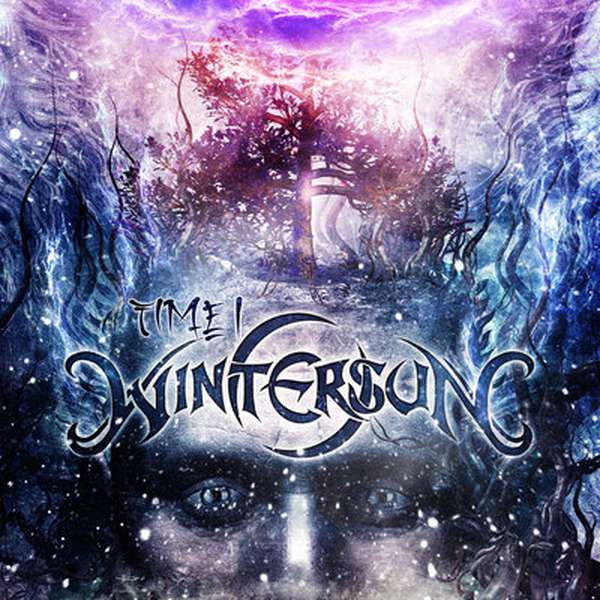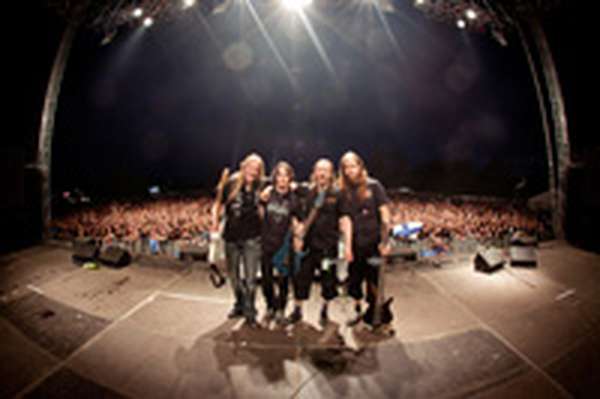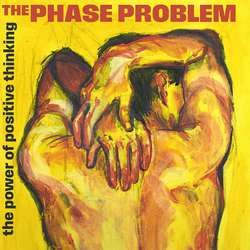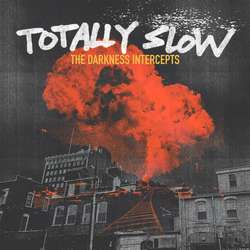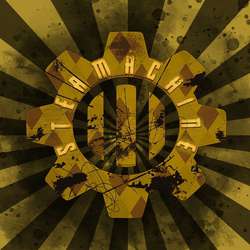Wintersun make even Godot look punctual.
The Finnish black/folk/power metal band was originally conceived as a solo project for Ensiferum guitarist/vocalist Jari Mäenpää, who released its eponymous debut in 2004. The album was incredibly well-received critically, so it was no surprise that a follow-up album, Time, was quickly announced and scheduled for release in November 2006.
No, that is not a typo. Two thousand six.
You see, Mäenpää is a man known best for taking his sweet, sweet time getting things done. Case in point: he started writing for Wintersun in 1995, spending eight years to write and record the full thing. Granted, when Wintersun first came into being, he was foremost a part of Ensiferum and doing his solo work on the side—it's not surprising the process was slow in going. But by 2004, he was working on Wintersun full time; you'd think that the process would've gone a bit faster, what with all of that time on his hands.
But it turns out that the reason Mäenpää takes his time is that he's also a damn perfectionist. Left to his own devices without four other bandmates to keep him in check, the album process quickly became long and drawn-out trying to accommodate his exactingly specific visions for each song.
It took until early 2012 before we finally got a release date that stuck. But even that announcement didn't come without one final kicker: because so much material was recorded for the album, Time was going to be released in two parts, with only the first half to be released in late 2012. I admit, it may take a lot of guts to stick to your artistic vision, but it takes nothing short of balls of steel to delay an album for six years and then nonchalantly announce that you'll only be releasing half of it.
So when Time I finally came out this year, not only did Mäenpää have to follow up on an album that received near-universal acclaim and show that it was worth the six years spent writing it, he now had to prove that the music was good enough to justify only releasing half of it. In short: the expectations for Time I were set unreasonably high before any of us even got to hear it. It's the Duke Nukem Forever conundrum applied to music.
And yet, despite those terrible odds, Time I actually turned out to be a pretty good album, if not quite what was expected.
The biggest thing to notice about this album is that it's a significant departure from the sound found on Wintersun. Almost all of the black metal aspects of the band's sound have been reduced to cameo status—aside from a few token blast beats and occasional screaming on Mäenpää's part, you'd hardly notice its presence at all. Instead, the album is influenced very heavily by power metal. The riffs are big, catchy, and melodic, the vocals are full of raw emotion, and the pieces are all incredibly moving. It sounds much more like melodeath than black metal in the pure.
The shift from the familiar “standard” sound of most folk metal bands to the Japanese folk-influenced sound is also very noticeable. Traditional Japanese instruments abound, highlighted in the shorter introduction tracks and peppering the arrangements of the central pieces. Though it's not an original idea by any means, the juxtaposition of traditional Japanese instruments with metal is uncommon enough that hearing it here is almost shocking and novel.
In addition, the band has replaced the neo-classical elements with outright symphonic metal. Instead of the subtle Malmsteen-esque chromaticism and light orchestral backing of their debut, Mäenpää went all-out and arranged full symphonic and choral backings for each piece. It plays well off of the epic power metal sound the band is trying to create, and the overall result is nothing short of pleasing.
The symphonic arrangements also highlight the album's complexity. As a result of its long time in development, it's unsurprising that the pieces are thick with intricate and purposeful composition. You can see Mäenpää stretched every piece to its maximum length just to make sure there's enough room for all of the instruments. (Supposedly, there are upwards of 200 tracks on each song.) You'd have to listen to this album an unreasonable number of times to hear everything that's going on.
Yet at the same time, the complexity is built around very straightforward ideas—it's still very easy to grasp the immediate thrust of each song without much trouble. The depth of arrangement is more of a reward for those who want to delve a little bit deeper into the music.
And through all of this, the songwriting is actually pretty good. Granted, it's nothing original by any means—this is the stuff that Blind Guardian and Symphony X have been doing for decades—but it is undeniably on the solid end of the spectrum. The major piece "Sons of Winter and Stars" in particular is worth the price of the album, an incredible 13-minute tour de force of unrelenting metal that will leave you wanting a cigarette afterwards.
The only thing that hasn't improved at all since Wintersun are the lyrics, which, frankly, are so insipid that it's insulting. This problem is also evident in the song titles, which tend to follow the “[dark noun] and [wintry noun]” formula to a t. Then again, it seems to be true with any power metal album the lyrics tend to be more generic as the music becomes more, well, power metallic. At some point, we stop listening to it because we care what the vocalist is saying and start listening to it just for the rush, and there's no doubt which side of that balance this album falls on.
The only other complaint I have about the album is that it's so damn short. Sure, 40 minutes is a reasonable length for most albums, but when you're writing an album of progressive-length pieces, that just isn't long enough to be fulfilling. Mäenpää only gets through three proper songs over the course of the album (plus the two shorter introductory tracks), and at the end of it all you just find yourself just wanting more. Listening to only this half on its own is frustratingly unsatisfying. I don't care if it would have been a double-disc album, l would've gladly paid extra for the second half to this album now instead of in 2013.
There's no way that this album should have been able to hold up to expectations. Yet while it still has some pretty noticeable flaws, Time I still manages to be just as good as it needed to be in order to justify the infuriatingly long wait for it. While it's not the same thing as their debut and it's also blindingly frustrating to only have half of it, if you're looking for an album that appeals both to the adrenaline junkies and thoughtful critics alike, this has got to be it.
Now if we're lucky we'll be listening to Time II by 2019.
Recommended if you enjoy: Blind Guardian, Kalisia, Symphony X
